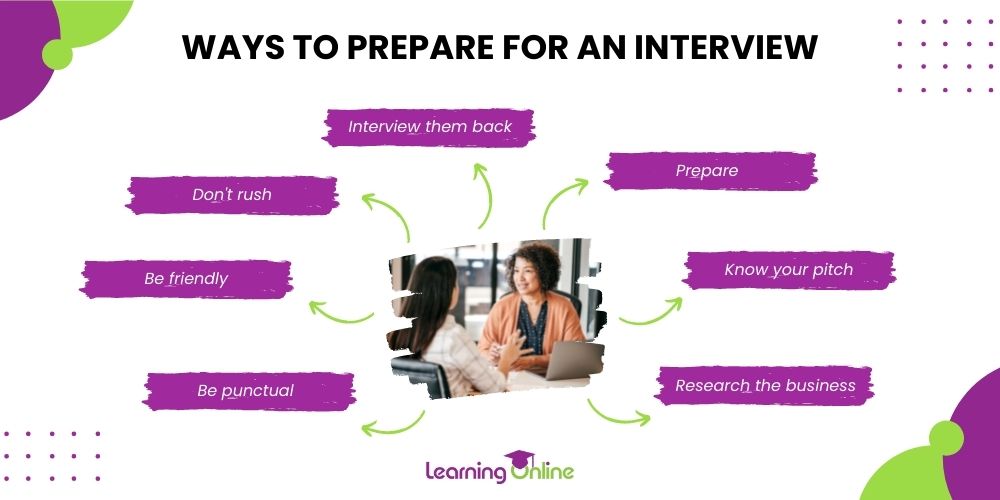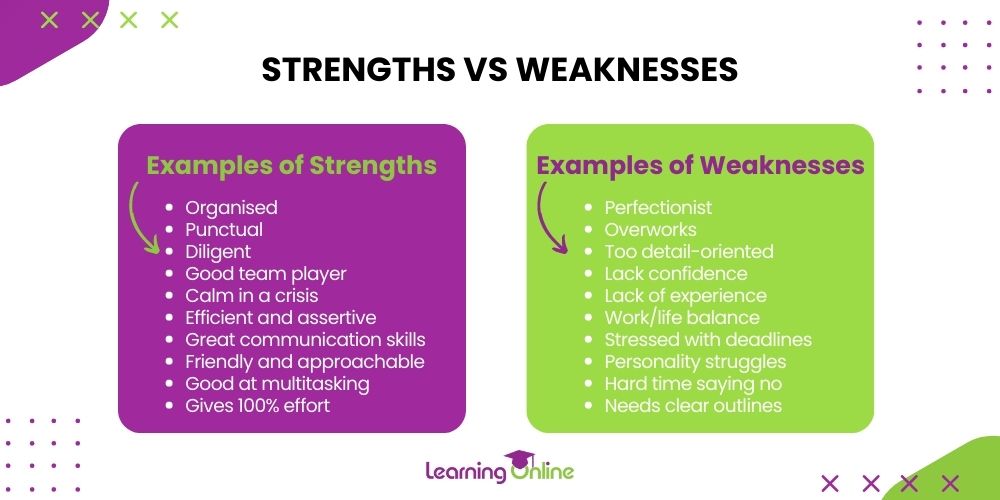Interviews can be nerve-wracking at the best of times. It’s naturally a high-pressure situation with a lot at stake, particularly if it is for that one job you REALLY want.
So, you’re sitting there, answering each question, starting to find your rhythm.
Then all of a sudden, the interviewer asks: ‘What are your greatest strengths and weaknesses?’
This question has the potential to completely floor you in an interview setting. You suddenly feel like you forgot your sales pitch, and you may find your mind begins to race or, worse, goes blank!
How do you sell yourself and display your strengths? What are your strengths and how are they relevant to the position you want? What are your weaknesses and how do you tell the interviewer about them without raising red flags and jeopardising your chance at the job?
The prospect of being faced with a question such as this in an interview setting can seem overwhelming. Luckily, My Learning Online is here to help!
In this blog, we explore the dreaded ‘strengths and weaknesses’ interview question, with tips to help you answer it with honesty – whilst also being confident that you know how to sell yourself to a potential employer.
Let’s dive in!
Interview confidence
To start things off from the best possible place, there are few things to remember when it comes to being confident in a job interview:
- Preparation – By making sure you are prepared to answer a variety of questions, and having a relevant portfolio, CV or evidence of previous experience in the field you are interviewing for, is one of the best ways to calm your nerves. Empowering yourself with knowledge and a plan in a foreign environment will put you at ease and make the whole experience seem a little less daunting.
- Know how to pitch yourself – The most important thing in any interview is to know yourself and to clearly communicate to a potential employer exactly what you can offer their business. Confidence is key (even if you’re just putting on a brave face), as this will help employers to trust that you are qualified for and can handle the demands of the job.
- Research the job/ business – Having some background knowledge on the company you are interviewing for will often impress, as it shows you’ve put in that extra effort to do your homework. It’ll also give you a clearer view on what kind of culture or environment you may be entering. You’ll be able to reference certain aspects of the company ethos or way of working that you find admirable or interesting and can then tailor your previous experience examples to fit the demands of the company.
- The importance of punctuality – Being on time for an interview is so important. Maybe arrive a little early, if you can! Being punctual means proving to the employer that you value their time and respect the interview process. First impressions really do matter in an interview setting.
- Friendly and professional – There is a fine art to getting the balance between friendly and professional just right. You want to remain formal whilst also showing your personality, passion and energy – without overdoing it. To be honest, you may never feel like you get the balance absolutely perfect; all you can do is be yourself and show you have what it takes to be the best person for the job.
- Do not rush – Nerves tend to make us rush and speed through our previously well-thought-out answers. Remember to take a deep breath and recognise that this time has been put aside specifically for you. Potential employers have brought you in because they want to know more about you, so allowing yourself to take the time and take up space in the room will calm your nerves and make you seem more confident and collected.
- Remember, you are also interviewing them – What many people forget is that a job interview goes both ways. A potential employer may be filling jobs, but you will also gauge from the interview whether this is a place you would like to work. If the company does not suit you or does not align with your morals and values, you can say no to the job even if it is offered to you.

Strengths and weaknesses: Showing your strengths and expertly displaying weakness for interview
We know that communicating your strengths and weaknesses in an interview can be cause for anxiety. So we’ve put together a few handy tips for properly relaying your employee strengths and weaknesses in a professional interview setting:
- Consider: What are the demands of the job? – What is the job outline and responsibilities, and how would your past experience and skill-set help meet these demands?
- Consider: What is the company looking for? – Be aware of what the company is looking for in an employee. What are their morals and ethos? What sets you apart from other candidates and what can you bring to the role that they can’t?
- Write Down: Strengths and weaknesses list – During your interview prep, it can be helpful to write down your strengths and weaknesses as a prompt so you are not left fumbling for answers should the question arise.
- Reflect On: How to be honest – When all is said and done, honesty is the best policy. Being upfront about things you perhaps struggle with – but then letting them know that you are striving to improve these areas and can learn new skills quickly – will ease any doubts they have about your employment. We are all human and employers know that everyone has things they struggle with, and if they are worth their salt they will be happy to help you learn and grow.
What are your strengths and weaknesses? Examples to get you started:
Not sure where to start? No problem! Here’s a list of both weakness and strength examples that may apply to you and which can be used in an interview setting:
Strengths:
- Organised
- Punctual
- Diligent
- Good team player
- Calm in a crisis
- Efficient and assertive
- Great communication skills
- Friendly and approachable
- Good at multitasking
- Gives 100% effort
Weaknesses:
- Perfectionist
- Has a tendency to overwork
- Can be too detail-oriented
- Can lack confidence
- Looking to gain more experience in certain areas
- Finds it hard to perfect the work/life balance
- Gets stressed when deadlines run over
- Past struggles working with challenging work personalities
- Has a hard time saying no to things
- Finding it harder when instructions are ambiguous – you like clear outlines and structure

Want to ensure your career is one you’ll love?
No matter your strengths or weaknesses in a job interview, one of the best ways to feel confident is to know your stuff and be genuinely passionate about your work.
With this in mind, here at My Learning Online, we have an abundance of courses in various career sectors to choose from, so you can select a course that you’ll absolutely love.
Why not check out:
- Photography
- Wildlife and Animal
- Beauty
- Agriculture and Farming
- Lifestyle
- Landscaping and Horticulture
All of our comprehensive, professionally curated courses are completely online, which means that you can access your learning 24/7, at whatever time suits you and your schedule.
Each course comes with a downloadable brochure, offering more info about course content, module breakdown and assessments, accessing your learning online and tutor support. We also have course fee payment plans available to make financing your future that little bit easier.
If there is anything you can’t find the answer to on our website, get in touch, and one of our friendly course advisers will be on hand to help guide you.
Enrol today and make sure you start interviewing for the jobs you want!





